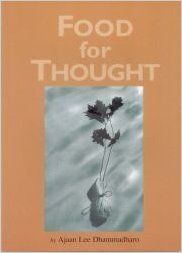
Food for Thought – Eighteen talks on the training of the heart is an introduction to the Buddhist practice of training the heart. It is taken from the talks of Phra Ajaan Lee Dhammadharo, a teacher in the Thai forest tradition of meditation, and is called Food for Thought because it invites the reader to fill in the spaces suggested by the talks—to reflect on how the images and teachings they contain relate to one another and to one’s own situation in life. Two of the talks included here, ‘Quiet Breathing’ and ‘Centered Within,’ briefly describe a technique of breath meditation aimed at giving rise to a centered and discerning state of mind. The rest of the talks deal with how to use such a state of mind in dealing with the problems of life: the day-to-day problems of anger, anxiety, disappointment, etc., and the larger problems of aging, illness, and death. This is a book concerned less with the techniques of meditation than with its meaning and worth: the questions of why should one train the heart to begin with, what personal qualities are involved in its training, and how to make the best use of it as it becomes trained.
Download it here (51 pages/260 kb):
 Food for Thought
Food for Thought
You can buy the print version here: Link
The Practice of Breath Meditation: Cultivating Calm and Clarity
Breath meditation, a contemplative practice rooted in mindfulness, offers a pathway to cultivating calm and clarity. By directing one’s attention to the natural rhythm of the breath, individuals can create a tranquil space within themselves. This focused awareness on the breath allows practitioners to detach from external distractions and immerse themselves in the present moment. By observing and regulating the breath, individuals develop a heightened sensitivity to bodily sensations, thoughts, and emotions, fostering a state of inner stillness and self-awareness.
Benefits of Breath Meditation: Nurturing Mental Well-being
Engaging in breath meditation regularly yields numerous benefits for mental well-being. In today’s fast-paced world, stress and anxiety have become pervasive concerns. However, studies have shown that breath meditation can serve as an effective tool for stress reduction. By deliberately shifting attention to the breath, individuals can alleviate the burdens of daily life and enhance their overall psychological well-being. Additionally, breath meditation has been found to improve sleep quality, offering respite from insomnia and promoting restful, rejuvenating sleep.
Breath Meditation and Academic Inquiry: Exploring the Intersection of Ancient Wisdom and Modern Science
The academic exploration of breath meditation unveils a fascinating intersection of ancient wisdom and modern scientific methodologies. Researchers delve into the cognitive, emotional, and physiological mechanisms underlying breath meditation, aiming to unravel its effects on attentional processes, emotional regulation, and brain function. Neuroimaging techniques, physiological assessments, and self-report measures are employed to bridge the gap between subjective experiences and objective measurements. Furthermore, scholars investigate the relationship between breath meditation and psychological constructs such as compassion, empathy, and overall well-being, contributing to the growing body of knowledge on contemplative practices.
In conclusion, breath meditation offers a profound practice for cultivating calm and self-awareness. Its benefits for mental well-being, such as stress reduction and improved sleep quality, make it a subject of interest for academic inquiry. Through the exploration of breath meditation, researchers are deepening our understanding of the physiological and psychological effects of this ancient contemplative practice, further enriching the discourse on mindfulness and its potential impact on human flourishing.

